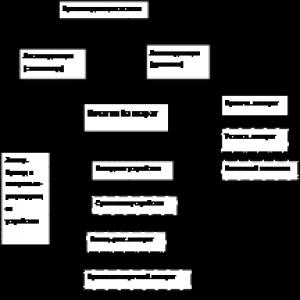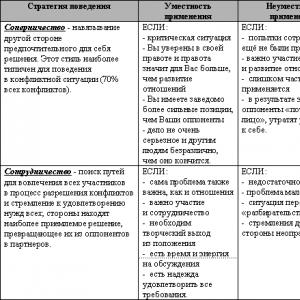The difference between outstaffing and staff outsourcing. What is the difference between outsourcing and outstaffing? Outstaffing contract template
What is outstaffing in simple words? How is outstaffing different from outsourcing? Which agencies provide staffing services and what is their cost?
Hello dear readers! Dmitry Shaposhnikov, one of the authors of the HiterBober.ru business magazine, is with you.
One of the ways to solve the problems associated with hiring personnel, optimizing the number of the enterprise is outstaffing - a service for the provision of personnel.
For 7 years I headed a large division in Stavropol of one of the leading telecommunications companies in Russia. Our company actively used outstaffing, especially in recent years.
Outstaffing can help you properly distribute the load on employees, relieve you of a lot of problems, save money and nerves.
By correctly implementing this tool in your business practice, you will revive your business, increase income, and partially get away from the problem of hiring staff. You will free up resources for development, you will have more time for planning.
Do you also want to use this tool in your business, so that neither the labor nor the tax authorities consider the law to be violated?
Then close the extra tabs of your browser and read this article carefully!
1. What is outstaffing in simple terms?
Let's start with a definition.
Outstaffing- a form of hiring temporary employees to perform different categories of work.
For example, you have just opened your store and you need to:
- train your consultants in sales techniques,
- hire a person for general weekly cleaning;
- periodically, 2-3 times a month, unload-load heavy goods.
And during the pre-Christmas sale, you will need additional sales assistants, who will then need to be fired. In addition, your full-time employees periodically get sick, go on vacation. It would be desirable to have a person who could come to replace if necessary.
If you enter into employment contracts with all these people, you will encounter the following difficulties:
- Difficulty of selection. No one wants to go to work for a few New Year's Eve days, once a week or several times a month. It is almost impossible to make money with such a schedule.
- The difficulty of getting fired. Even if there are those who wish, you must conclude an employment contract. Usually it is concluded for an indefinite (long) period, and you need - for 2 weeks. If the employee does not agree, problems may begin.
- Paper work. A lot of documents are drawn up for each employee, and soon you will be faced with the need to hire another HR inspector, and this is an additional cost.
You, as the director of a store or any other enterprise, will be saved by outstaffing.
In simple words
Outstaffing- this is the provision of personnel for rent by a third-party company. At the same time, this staff is registered with the outstaffing company.
To implement such an idea, three parties are needed: the employee himself, the company that needs him, and the recruitment agency. The latter draws up an agreement with the candidate in accordance with the Labor Code, pays insurance premiums for it, but the workplace is located in the interested company.
You set the agency that provides outstaffing services with the requirements and profile of the position, and it takes care of loading the work schedule of employees, paying fees, and being ready to come to you on demand.
Do not resort to outstaffing if you are hiring core staff. With consultants and cashiers in a store, with engineers and key workers in production, with doctors and nurses in a hospital, if you plan to employ them full-time for a long time, you can and should conclude indefinite employment contracts, provide them with all guarantees and social benefits.
2. How is outstaffing different from outsourcing?
Until now, in many contracts and even in the definitions of courts, outsourcing refers to the selection and provision of personnel at the disposal of the customer, and this is outstaffing.
These two concepts have nothing in common. The table below shows these differences clearly. We have previously written about .
Comparison table of outstaffing and outsourcing:
Thus, outsourcing and outstaffing are different forms of contractual relations and forms of fulfilling the company's tasks. Confusion in concepts can lead to incorrect interpretation of the terms of the contract by different parties, and, therefore, to conflict, severance of relations, fines and other unpleasant consequences.
3. New in the legislation: is outstaffing prohibited since 2016?
Let me just say no, no, and no! The ban on outstaffing is a myth invented to create a stir around the topic. What actually changed? The legislator introduced a new concept - Agency work, which has been "vetoed" since 2016.
agency labor- this is an uncontrolled rental of any personnel for any purpose and any work. In Russia he prohibited since 2016.
Outstaffing has not been prohibited since 2016, subject to legal restrictions.

The benefits of outstaffing, if used correctly, are obvious.
Companies can save on temporary, seasonal employees, on the performance of work in secondary (non-core) activities, in places that do not require serious training or special education.
And that's not it. Resourceful employers have come up with a simple but effective system, like with the help of outstaffing:
- Pay less for accident insurance. A company that is engaged in high-altitude, underwater, underground and other hazardous / hazardous work, then such a contribution for each employee will be high. But if you hire a specialist whose employer is a recruitment agency, the insurance premium will not exceed a hundred rubles, because the main activity of the outstaffing agency is not high-altitude / underwater / underground and other dangerous and harmful work, but recruitment. Only workers with injuries and occupational diseases received at the workplace suffer from such a scheme - they cannot count on full-fledged insurance.
- Save on insurance premiums for employees. Contribute smaller amounts to the Pension Fund for employees who are entitled to early retirement due to their working conditions. A miner whose employer is a recruitment agency will not receive an early pension, although he actually works in conditions that suggest such a pension.
- Save on vacation. Do not pay for additional leave due to some categories of employees, because they are employed in an outstaffing company, and not in hazardous production.
- Replace employees quickly. For example, "undesirable" and "obstinate" workers who went on strike can be quickly replaced by others. To avoid downtime, the company hires suitable specialists and continues to work.
Such manipulations and games with the law could not go unnoticed by the legislator for a long time, therefore, since 2016, outstaffing has undergone changes and restrictions.
For some categories of workers, in order to protect their rights, only a direct employment contract is provided with all the benefits required by law: additional payments for harmful or dangerous working conditions, early retirement, additional paid leave, accident insurance.
4. Outstaffing and agency work: the main differences
Until 2016, when no form of leasing personnel was regulated by law, these two concepts could be considered synonymous.
Let me remind you that agency work involves the replacement of any workers, for any period, for any purpose, without restrictions. This form of staff outstaffing is now prohibited in our country. Moreover, since 2016, a third party has appeared - the employee himself. With agency work, his opinions could not be taken into account - an order from the employer was enough. And during outstaffing-2016, he acts as a full partner, consciously entering into an agreement and giving voluntary consent to work in the company.
In order not to “slide” into illegal hired labor, very specific requirements must be met when concluding an outstaffing agreement between a recruitment agency and a company.

Companies are prohibited from using leased personnel:
- during strikes of key workers, during downtime associated with non-payment of salaries to regular staff;
- at hazardous facilities, at workplaces with harmful working conditions;
- when the qualifications and education of employees are necessary to obtain licenses, accreditations and permits (doctors in medical institutions, teachers in educational institutions, chief engineers and mechanics in production - all these workers must be on staff and cannot be rented.
5. Sample contract for outstaffing for download
In addition to legal restrictions, when concluding a contract for the lease of personnel through outstaffing, it is necessary to provide for many details that, if neglected, will cause additional costs. For example:
- Are services for the selection, selection of applicants included in the price or are they paid separately?
- can the contractor (recruitment agency) change employees without agreement with the customer company?
- actions of the parties in case the presented candidate does not meet the requirements?
- many other minor little things that they pay attention to only if there are problems with them.
To immediately foresee all possible situations and insure yourself against potential problems, you need a qualified lawyer. And if his services are too expensive? The Internet will come to the rescue! In drawing up a contract, for example, a service such as QuickDoc with a sample outstaffing contract can help you. By changing positions, you can get different terms of the agreement.
6. What agencies provide staffing services and commissions for outstaffing companies?
Since 2016, personnel provision services can be provided by:
- accredited recruitment agencies;
- legal entities or entrepreneurs - under agreements with affiliated companies and with the consent of the employee.
In St. Petersburg and Moscow, outstaffing is carried out by the following agencies:
- Zest Staff(zest-personal.ru)
- Interprime(interprime.rf)
- Contact Service(okcall.ru) - call center
- Credence(credence.ru)
- HR Advisor(outstaffing-sovetnik.ru)
The following requirements are imposed on outstaffing companies: they must apply only the basic taxation system, work without debts on payments to the budget, have at least a million rubles of authorized capital, and the head of such an agency must have a higher education and professional experience.
The customer pays the agency a single invoice, which includes:
- employee's salary;
- personal income tax;
- contributions to the Pension Fund, MHIF, FSS;
- vacation pay, calculation upon dismissal;
- agency commission. It provides compensation for personnel records management, accounting and tax support for personnel, reporting for each employee. The increased commission may include recruitment services.
- other services: provision of overalls, uniforms, training, medical examinations, etc.
The average agency remuneration is on average 1-5 thousand rubles for each employee. Most contractors offer a discount for the number of employees.
The cost of outstaffing is low, otherwise it would not make sense.
To better understand what outstaffing is and in what cases companies resort to it, watch the video from Stolitsa FM radio:
7. Conclusion
Now you have learned more about such a way of working with personnel as outstaffing, as well as about new legislative requirements in this area. We hope this article was helpful to you. Today, this service can be used by any company that wants to legally reduce labor costs.
All that is required is to comply with the basic provisions:
- The temporary nature of the work of the leased personnel;
- Consent of the employee to his own lease;
- Workplaces without harmful or dangerous factors;
- Working with an accredited outstaffing agency.
Compliance with these points will allow you to work calmly, saving money and not violating the current legislation. I wish you success!
What is outsourcing and what is its main feature? This term implies the transfer by the firm to third-party performers of those functions that were previously performed by the company's personnel on their own. The most striking example here is accounting. Modern operating small and medium-sized businesses have long ceased to maintain their own accounting on their own. Firstly, it takes too much attention and effort, and secondly, because an accountant is a whole staff unit (or even several at once).
It is much more profitable to give this topic for execution to a professional accounting company, whose specialists quickly and efficiently prepare reports and balance sheets for dozens of clients. The productivity of their labor (due to specialization and separation of functions) is much higher than that of the accountant of the customer enterprise, which means that the price of an outsourcing service will be less than the total cost of its production on its own.
The opportunity to save costs and increase labor productivity through the centralized provision of works / services, as well as due to specialization (division of labor) is the economic justification for the existence of an outsourcing scheme. Well, how can one not recall A. Smith with his example of the production of pins?
Now competent directors are trying to outsource everything they can:
- accounting (of course);
- cleaning of premises in offices and production areas (professional cleaning);
- catering for employees;
- organizing the delivery of personnel to workplaces, if these places are located far from the places where people live, etc.
For all these services/works (and outsourcing concerns only services and works), the company pays money, moreover, customers save money, and the producers of these services also manage to make money on their production. At the same time, the director of the company gladly outsources as many of these secondary, but necessary topics as possible, because these topics cease to concern him and distract him from the vital business processes associated with generating revenue and generating profits.
Outstaffing
Outstaffing is sometimes called personnel leasing. This is fundamentally wrong, since, in its economic essence, leasing is just an installment plan for the acquisition by a legal entity of expensive fixed assets, which is financed with bank lending.
It would be more correct to call outstaffing a lease of a staff of workers or some part of it. The concept of outstaffing involves the transfer of the entire staff of the company "to the balance sheet" of another company. After that, this company provides the same employees to the company (which is now the customer of the outstaffing company) for rent.
Of course, it is not people who are rented out (serfdom has not yet been formally renewed anywhere in the world), but their work - obligations under the contract to carry out useful activities in accordance with the job description and in the interests of the customer.
This format of work organization can be beneficial for the customer for several reasons:
- It is not profitable for the customer company (or simply does not want to) deal with numerous labor disputes and, in general, be a responsible party in them.
- Some types of business are very risky (for example, we are talking about working in financial markets). Real-minded owners of financial companies understand that they are actually hostages to the professionalism of some of their employees when they take on the responsibility of guaranteeing something to others. In this regard, in an effort to reduce the risks for themselves of finding themselves with pay obligations to a large number of their own staff in a crisis situation, the leaders of such companies transfer personnel to an outstaffing scheme of work.
Like, if “the water is calm”, then the customer company earns and pays rent to the outstaffing company. And if “there is a crisis on the collective farm,” then the customer company simply terminates the staff lease agreement and, as a result, stops paying for it. No tragic layoffs, no ruined careers—the obligations don't default because they never came up.
- Heads of companies that order outstaffing services get the opportunity to automate their business, minimizing the unpredictable factors of human behavior and the poorly predictable “relationship resource”.
Now it’s not a specific performer who can dislike, but the results of his work. And if the head of the customer company is not satisfied with how this particular employee works, then the outstaffing company recalls him and puts another one in this place. At the same time, the former employee is not fired, but simply transferred to a new position in accordance with his qualifications.
The difference between outsourcing and outstaffing
Now, having understood the essence of these two terms, we can trace their differences.
In fact, outstaffing is a special case of outsourcing.
The personnel provision service is not performed independently by the company's specialized personnel, but is outsourced to an outstaffing company, which not only provides the necessary personnel, but also replaces them in case of their unprofessional behavior and a drop in productivity and their personal effectiveness.
On the other hand, the economic significance of outstaffing is not just to select personnel, but to free the customer company from interacting with all types of problems that arise with the mere presence of a staff.
It is very difficult, at times, to compare cleaning services outsourced and services for providing the company with working personnel, also outsourced to a third party. After all, many are accustomed to the fact that a company cannot exist without a close-knit team of employees, which is its personification ... It turns out that it can.
For these reasons, it can be said that outstaffing and personnel outsourcing are the same concept, although, of course, a simple comparison of outsourcing and outstaffing demonstrates that the first concept is much broader. After all, here we have accounting, and cleaning, and lunches, and everything, everything, everything that is secondary for the company, and in the case of outstaffing, only personnel.
And it is precisely here that the fundamental difference lies, which makes one generally think about the correctness of comparing these two concepts under consideration. The fact is that outsourcing affects only non-core, and therefore secondary types of activity in the company:
- yes, without bookkeeping and reporting, a company cannot exist, but it is a servicing service that does not generate either revenue or profit (but only calculates it);
- of course, employees without regular lunches can start looking for another job, but this is also only a costly item related to earning income only indirectly;
- it is the same with cleaning: yes, in cleanrooms, as a rule, there is more profit, but there is still no direct connection with the income generated here.
But the services provided through the implementation of the outstaffing scheme are directly related to the generation of revenue. After all, the customer company acquires not just personnel units, but, to put it cynically, in the person of each “rented” employee, it receives the tools with which it generates its profit.
And if the main benefit from outsourcing for an entrepreneur (in addition to financial savings) is determined by the saying “Out of sight, out of mind”, then the same cannot be said about outstaffing. A diligent manager will closely monitor the quality of work of the personnel “supplied” to him by the outstaffing company, even if in the past it was the company’s own staff transferred to this work scheme.
The only thing that will go “out of the heart” of the management of the customer company is personnel disputes and litigation. This topic will completely “fall” on the shoulders of the outstaffing company.
Summary
So what is the difference between outsourcing and outstaffing? Both concepts imply the transfer of certain issues and topics of the company's functioning to third-party performers (on a contract basis).
And here outsourcing is a broader concept, since outstaffing implies exclusively personnel topics. But the latter concept is directly related to the topic of generating the company's revenue, while outsourcing implies taking “overboard” secondary, non-core topics. This is the fundamental difference.
The world of modern business and production has its own language and its own terms, which are not inferior in complexity and intricacy to the world of science or youth slang.
"Start-up coworking in a loft open space" sounds like a spell to summon demons, but it's actually starting a business to offer comfortable workplaces in one large office space with an industrial design. How many words are saved when using slang!
Fortunately, there is no need to memorize all these terms, since most of them occur from English. It is enough just to translate the terms into Russian in your head, and you get an approximate interpretation of strange words. But sometimes the terms have an almost identical translation.
For example, a couple of terms - outsourcing and outstaffing - have similar origin and meaning. What do they mean, how to distinguish them and how to use them correctly?
Outsourcing
As mentioned earlier, this term comes from the English language, or rather, the term outsourcing, which can roughly be translated as "using an external resource". It means exactly this - the company's involvement of third-party performers and the complete transfer to these performers of any function in the company.
Most often, functions and responsibilities are transferred to third-party companies that are not do not require close attention or are outside the core business of the parent company.
If no one from your staff wants to engage in a certain activity, or maintaining such a workplace will be too expensive, or you just don’t want to inflate the staff and get unnecessary bureaucratic fuss, this activity is transferred “for outsourcing”, to a specialized company that professionally and purposefully deals with this particular function.
Outsourcing can be used practically at any level of professional activity. Most often, the services of an outsourced accountant, hired outsourced security, a translator, and even an incoming cleaner who works with several offices at once and cleans for many companies, ultimately making a big profit, are most popular.
Outsourcing can often be confused with freelance- one-time involvement of a third-party specialist to perform a specific job. Unlike freelancing, outsourcing involves long-term cooperation with the conclusion of a contract and the complete transfer of a function or activity to another company, while a freelancer does not completely replace the labor of his workers with his presence.
Outstaffing
This term is similar in structure to outsourcing. Stuff from English it is translated, among other meanings, also as “staff”. That is, if translated literally, outstaffing is the involvement of third-party personnel? Not certainly in that way. Most often, outstaffing is the reverse process - removal of personnel from the company's staff.
Why is this necessary, what is the point? The withdrawal of personnel to a separate company allows you to focus all the efforts of this company precisely working with staff– payment of taxes, pension contributions, salaries and bonuses, work with holidays and sick days, hiring and firing new employees.
The main company, on the other hand, can focus its attention entirely on its core business, concluding agreement with a subsidiary on hiring employees.
This technique allows you to bypass many different obstacles, for example, the limitation on the size of the staff. Also, all the risks associated with personnel, various unforeseen events and disputes with employees fall on the shoulders of the subsidiary, outstaffing company, which relieves the main company from a headache.
Of course, outstaffing opens up a wide field for manipulation and other abuses. Often, so-called “one-day firms” are used as an outstaffing company, which allow companies that order outstaffing to exploit personnel, violating labor laws.
In the event of claims or even lawsuits, the one-day firm simply disappears, leaving the employee with nothing.
The difference between outsourcing and outstaffing
After explaining the exact meaning of the terms, the difference is not difficult to discern. Outsourcing is transfer of any activity to another company. That is, another company undertakes to perform certain work, and how exactly it will do it is already its concern, the customer is only interested in the fact of fulfilled obligations.
Outstaffing is not a transfer, but, on the contrary, a reception, and not an activity, but outside workers. The customer company literally rents workers for its activities, which it will organize and monitor the implementation of. And the outstaffing company undertakes only to provide suitable personnel and assume all contacts and all obligations for working with this personnel.
If you have ever looked for a job, then most likely you have come across outsourcing companies. They help companies hire workers for a fixed fee. At the same time, the employees themselves do not need to make any cash payments. Along with outsourcing, there is the concept of outstaffing. They are similar, but not synonymous. You can read about the difference between outsourcing and outstaffing, and what are the pros and cons of these areas, in this article.
History of outsourcing
The term "outsourcing" comes from the English expression "outside resource using", which translates as "use of external resources". The profession of a recruiter appeared in the 19th century, just then, of course, no one called it that. The first outsourcers can be considered people who hired sailors for long voyages. They looked for staff, agreed on wages and received their percentage of the proceeds. Peter I can also be called a kind of recruiter, because he attracted hundreds of personnel from abroad for the construction of St. Petersburg, among whom were engineers, architects, teachers, nobles.
In the 19th century in Great Britain and some other European countries, services for hiring security guards, household staff, accountants and stenographers began to gain popularity. In the 20th century, outsourcing began to develop rapidly. One of the key figures can be called the General Motors company, which received a powerful impetus for development precisely thanks to the attracted qualified personnel. In the 1950s, the first highly specialized companies began to appear in the United States, which were engaged in the search and hiring of personnel for a specific area. For example, an IT outsourcing company or a company that hires accountants for small businesses. Such services became very popular as they helped to save the budget by not hiring full-time employees. Outsourcing came to Russia quite late: already in 1990. The first agencies had limited capabilities, but gradually employers realized the full benefits of attracting employees from outside. At the moment, outsourcing technologies are used in many business structures and government organizations.
What is outsourcing?
Outsourcing was not in vain popular several centuries ago. It is based on the idea of separating individual business processes and delegating some of the tasks to third-party companies. The division of labor is very effective, and not only for large organizations. Conducted studies prove that when an employee works in multitasking mode, his ability to work decreases, and the quality of task performance suffers. Transferring part of the responsibilities to a professional has a positive effect on the speed of work and the result. More than 84% of company owners are satisfied with the outsourcing services rendered. Among other things, the concept of outsourcing helps to improve the quality of the product. Thus, attracting personnel "from the outside" has an impact on three sides:
- Time of production or service.
- Cost of goods.
- Quality.
There is a certain classification of outsourcing companies by industry and production. As a rule, one firm specializes in only one direction. What industry-specific recruitment companies can you meet?
- Construction.
- Accounting.
- Financial.
- Legal.

These are the most demanded directions in the modern world. Attracting qualified personnel on their own can be quite difficult, so companies often use the help of outsourcing firms. The benefits of this practice are obvious: for example, in America, where hiring has been flourishing for decades, labor efficiency is several times higher than in Russia.
Outstaffing
The development of management dictates new criteria for optimizing business processes. One of such technologies is personnel outstaffing, which allows to reduce production costs. Many people confuse it with outsourcing. But there are differences between outsourcing and outstaffing, despite the similar sounding of the terms. What is outstaffing? This is a kind of "loan" of personnel from another organization that has the necessary personnel. This is indicated by the origin of the word: out - “outside” and English. staff - "staff". The employing company concludes an agreement not with another enterprise, but with employees who are transferred to its temporary disposal. At the same time, they conclude a temporary agreement, which prescribes a list of works that they undertake to perform. That is, formally, employees are on the account of one enterprise, and perform the tasks of another.
Outstaffing is usually a temporary measure that is required under different circumstances:
- During maternity leave or hospital staff.
- For short term projects.
- To perform work with harmful working conditions.
The concept of outsourcing and outstaffing helps to choose the right way to attract staff. Outstaffing gives employers unlimited freedom of action. They are not required to deal with the deduction of taxes and paperwork - this is usually taken over by the company that provides personnel. Also, the employer may at any time refuse the services of such an employee, without explaining the reasons for dismissal and without paying a penalty. Therefore, in 2016, amendment 53.1 was introduced to the Labor Code, which limits the outstaffing of personnel. Now temporary staff must work in the company for at least 9 months.

Functions
In order to answer the question of how outsourcing differs from outstaffing, you must first understand what functions they perform. Outsourcing, like outstaffing, can take on any functions of the enterprise. The most common tasks are:
- Calculation of wages, taxes, preparation of accounting reports.
- Software development.
- Cleaning of private apartments, offices, buildings.
- Construction works: erection and repair of buildings and complexes.
- Maintenance of ground and air transport (airports, railways).
- Legal support of transactions and activities of the company.
- Advertising companies, development and promotion of new products.
- Personnel management, cost optimization.
For any function or task that you need to solve, there is a specialist who will do it in the shortest possible time and with high results. That's what outsourcing companies are for. They allow you not to hire permanent staff, but from time to time to look for professionals for the right purposes.

What is the difference between outsourcing and outstaffing
Outstaffing is often confused with outsourcing. Meanwhile, these are completely different services. They have legal, legal and functional differences. Outstaffing companies provide their staff to third parties for a period of 9 months or more. A feature of this form of recruitment is that legally employees remain registered with the outstaffing company. They are connected with the customer company by a temporary contract, according to which the company undertakes to pay the agreed amount after the completion of the work. The main point of outsourcing is to transfer part of the business processes to a third-party company, and this is the main difference between outsourcing and outstaffing.
But there are other differences as well. An employee of an outsourcing company, as a rule, receives a job, salary and a number of job descriptions. In fact, he differs from a full-time employee only in that he is hired for a short period of time. If a specialist is attracted by an outsourcing company, then his schedule is usually not standardized, he is only required to complete the assigned tasks. Having studied these features, you can get an idea of how outsourcing differs from outstaffing. It should be noted that both forms in Russia are still poorly developed at the legislative level, so there are often scammers among outsourcers.

similarity
If everything is clear with the differences, the similarities between outstaffing and outsourcing are even more obvious. Both firms use their reserves for the following tasks:
- Risk minimization.
- Improving product quality and company efficiency.
- Decrease in financial expenses.
- Tax optimization.
- Acceleration of production processes.
Despite the differences between outsourcing and outstaffing, both directions are designed to save the company money on the biggest expense item: staff salaries.
Advantages
Outsourcing has become quite popular lately, and many companies are considering using the services of recruitment companies. What are the advantages of outsourcing and outstaffing?
- Saving money and time is one of the most significant arguments in favor of outsourcing. Often, small companies accumulate a lot of specific work that requires certain knowledge and skills. In the absence of a better alternative, it is blamed on employees of the company who do not have such experience. The result leaves much to be desired, performance drops. In this case, the involvement of temporary professionals can be a good way out.
- Freer contractual relations make it possible to terminate the contract in accordance with the procedure established by law. There are still significant concessions regarding the involvement of personnel "from outside".
- Outsourcing can prevent many unpleasant situations. For example, in case of dismissal, maternity leave or sick leave, the company will simply offer another professional. Also, an agreement with an outstaffing company can save you from labor disputes and tax reports.
- You can be sure that your tasks will be completed on time. An outsourcing company is interested in the high quality of its services, so employees perform their work efficiently and on time.
Flaws
Outsourcing and outstaffing also has certain disadvantages, which are associated with the peculiarities of these areas.
- An incorrectly performed task is the result not so much of the negligence of hired employees as of an incorrectly set task. Therefore, when setting goals, it is important to draw up a technical task in more detail.
- Bankruptcy of an outstaffing company may lead to default.
- By outsourcing some of the tasks to third-party employees, you risk the company's privacy. Of course, a non-disclosure clause will be included in the contract, but this does not exclude the possibility of industrial espionage.

Personnel leasing
In addition to outsourcing and outstaffing, there is personnel leasing, which is the hiring of seasonal workers. One party in leasing is recruitment agencies that look for and provide the necessary personnel. On the other hand, there are enterprises that need temporary staff. For example, for seasonal cleaning of the territory or repair of the premises. The difference between leasing and outstaffing is that in the latter case, the staff is provided by another, non-core organization. And leasing, as a rule, is handled by professional recruitment agencies.
Outstaffing and outsourcing agreement
The difference between outsourcing and outstaffing lies not only in the forms of personnel involvement, but also in the contract. The following parameters are displayed in the application for the provision of outsourcing services:
- The nature and scope of work.
- Payment.
- The number of employees involved from outside.
- The result of their activities.
- Preservation of confidentiality.
During the conclusion of the contract for outstaffing services, the employer carefully writes:
- The number of involved employees.
- Labor payment.
- Additional legal and legal agreements with temporary personnel.
Thus, the main difference between outsourcing and outstaffing agreements is that with outsourcing services a full-fledged agreement is concluded, and during outstaffing only an agreement on the provision of personnel is valid. But even for this, the recruiter must meet certain criteria stipulated by Article 56 of the Labor Code of the Russian Federation. The difference between outsourcing and outstaffing is clearly visible at the legal level, so it is incorrect to compare these concepts with each other.

Modern market relations are developing extremely dynamically. Not so long ago in our country, two options for using the labor of freelancers with foreign names "outsourcing" and "outstaffing" were widely used. At first glance, both these types of relationship between the employee and the employer are very similar. Indeed, they have similar features, but there are also colossal differences. Therefore, in no case should you confuse these two concepts.
The agency "Your Personnel" is ready to offer its clients both outsourcing and outsourcing. But in order to choose the most optimal option, you should clearly understand what they are and how they differ.
general description
The difference between these two services starts with their very definition.
- Outsourcing is an English word that can be translated as “foreign resources”. At its core, this is the transfer by a company of any of its non-core functions to a third-party contractor who performs this function on a contractual basis.
- The term outstaffing literally means "freelance". Using this service, the company transfers part of its employees to the staff of an outstaffing organization. At the same time, they continue to work and perform their functions in the old place.
Main differences
The main differences between outstaffing and outsourcing include:
- a form of labor - outsourcing offers the full performance of any work or the provision of services, with a guaranteed required result and control by the outsourcer. Outstaffing is simply the provision of personnel of a certain qualification on a temporary or permanent basis;
- labor remuneration - as a rule, the outsourcing agency receives remuneration after completing the required work, with outstaffing, the customer constantly pays the outsourcer's costs associated with hiring and maintaining staff;
- conclusion of an agreement - when outstaffing, an agreement is concluded between the customer and the contractor that fully regulates their relationship, and also excludes any types of labor relations between the customer and the staff. An outsourcing contract is essentially identical to a regular contract;
- functions performed - outstaffing is used to perform both complex tasks and simple jobs. Outsourcing is more often used for complex intellectual tasks of a legal, accounting and personnel nature.
In addition, the purposes for which these two types of relationships are used are very different. Outsourcing is used when:
- the emergence of vacancies for a short period - when employees go on vacation, maternity leave or sick leave, send them on business trips and other situations;
- the need to perform temporary or seasonal work;
- the need to implement a new project in the face of a shortage of qualified employees, equipment or premises.
Outstaffing services are most often used for:
- the desire to reduce the staff without losing staff;
- the need to reduce the costs associated with the taxation system used;
- the desire to optimize overall staffing costs and reduce the legal risks associated with hiring staff;
- the need to use the labor of personnel in regions where there is no possibility or desire to open their own representative offices.






